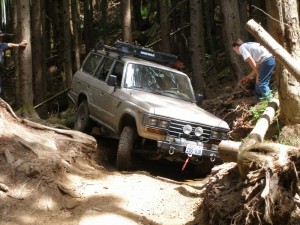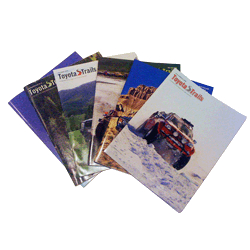 For us, the epitomy of Land Cruiser design is the 60 series wagon. It doesn’t look like a car, truck or any other rig on the road. While being a wagon it does pay tribute to it’s past with several design details that come straight from the 40 series. Just look at the raised center section of the hood and the lines on the front fenders.
For us, the epitomy of Land Cruiser design is the 60 series wagon. It doesn’t look like a car, truck or any other rig on the road. While being a wagon it does pay tribute to it’s past with several design details that come straight from the 40 series. Just look at the raised center section of the hood and the lines on the front fenders.
Tougher than hell, it sits on what many have called a 1 ton chassis. Leaf sprung on solid axles it is hard to beat the dependability and durability that comes from these things at the factory.
The 60 series wagon was made for 10 years, from 1980 to 1990. Lots of variety, gas, diesels, 4 and 5 speeds, autos, manual and vacuum controlled t-cases and a lot of options that weren’t even available here in the US.
FJ 60 Pretty much the only 60 sold in the US from 80-87 2F motor and an H42, other trannys were available elsewhere but not here. Round headlights. 3.70 gears in the diffs. Vents cut in the front fenders.
BJ 60 and BJ 61 (1983) The venerable 3B. 4 and 5 speeds. The only difference between the two I have found is the 61 has a rotary injection pump, also called a distributed system in Japan, appears to be for emissions reasons. Some early Canadian models even had manual steering which is what I have. Dual batteries (I think all the diesels had them) No vents in the front fenders of any of the diesel models, this is the quick way to identify a diesel.
HJ 60 (1982) and HJ 61 (1985) 2H power for the 60 and the turbo 12HT in the 61 also 4 and 5 speeds, even auto’s in some (1984 behind the 2H) By 1988 Australian models had limited slip diff’s standard as well as full float rear axles. Full floats have a drastic improvement in load carrying ability.
FJ 62 Last of the 60 series 1988-1990 3FE and an A440 auto tranny, Square headlights What might be called the upscale model of the series. Electric windows, door locks, mirrors, power antennae, vacuum controlled t-case, back seat headrests. 4.11’s in the axles. A slightly stronger frame at the back due to an extra crossmember, other than that the frame is pretty much identical to earlier 60 frames.
![]() Overseas you could get ambi doors, sliding rear side windows, cable lockers, 60/40 split front seats, rear split seats (Eric saw them in Japan) as well as a third row of fold up seats, Euro mirrors, limited slip differentials, full float rear axles, better looking passenger grab bars
Overseas you could get ambi doors, sliding rear side windows, cable lockers, 60/40 split front seats, rear split seats (Eric saw them in Japan) as well as a third row of fold up seats, Euro mirrors, limited slip differentials, full float rear axles, better looking passenger grab bars
-Paint Colors-
Solid Colors – Alpine White, Brown, Desert Beige, Freeborn Red, Royal Blue
Metallic – Charcoal Grey, Cognac, Grey Blue, Root Beer, Sky Blue, Stardust Silver
-General Specs-
Weight Lots. I have seen curb weights listed of around 4300 lbs but I don’t believe it. More typical weights are between 5400 and 6400, just depends on how much junk you haul around. Last time I pulled off the scale my rig was around 6500 lbs, loaded with camp gear and the kids. I think Eric’s weighs even more. If your rig does come in around 4300 I want your secret.
Length 184 in This doesn’t include the tire and jerry cans on the back or the winch sticking out the front….
Width 71 in Mine is a touch wider due to the rock sliders
Height 70 in for stock. My lifted BJ stands 74 in to the top of the roof and is 84 in to the top of the roof rack. Even taller when loaded. No parking garages for me.
Wheel base Just over 107 in
Track (wheel mount surface width) 58.5 Rear 57.9 Front
Dimensions of the cargo space 59 in window to window, 42 in between the wheel wells, 44 in on the floor between the seat bottom and tail gate but only 38 in at the top of the seat to the tailgate due to seat tilt and 35 in high through the open tailgate, almost 40 in high inside. Folding down the back seat adds about 28 in to the length of the space.
Stock Rims 15 x 6 with a 3.5 in back spacing. Stock tires on most of them was H78/225-75R15. This is a really small tire only about 29 in High.
This brochure is worth the read. Its the factory brochure for the 1987 model year in Australia FJ62_specs[1] I got it from Toyota Australia while searching for info on my full float axle.
-The Paris Dakar Rally-
I was messing about elsewhere on the net and came across this interesting info. FJ and BJ 60’s competed in the Paris Dakar Rally. Did pretty well too. The first 60 entered was in 1981 and while it didn’t meet the time deadline it did make it across the line to finish. In 1984 an FJ 60 finished 3rd in the marathon class. With a BJ 61 finishing 46th overall and another BJ 61 taking 6th in the assistant class. 1985 saw a prototype FJ 60 cross the line in 4th overall. Not that I know what these classes mean but just finishing Dakar was and still is a major accomplishment. This link is where the info came from http://www.toyota-global.com/showroom/vehicle_heritage/landcruiser/gallery/
![]() This info has come from a lot of sources. Thanks to TLC4x4.com, CruiserOutfitters, Specter Off Road, Toyota, IH8MUD
This info has come from a lot of sources. Thanks to TLC4x4.com, CruiserOutfitters, Specter Off Road, Toyota, IH8MUD

